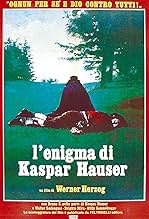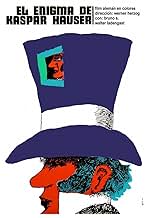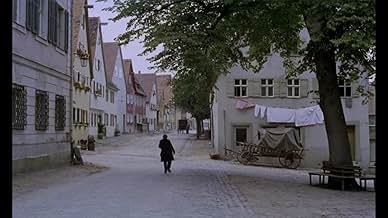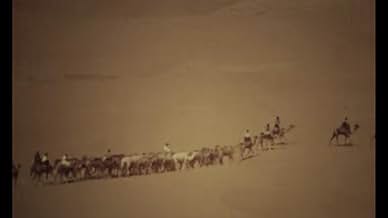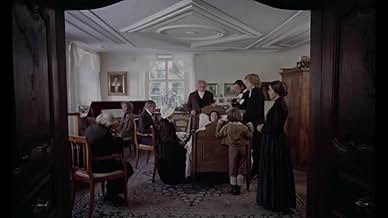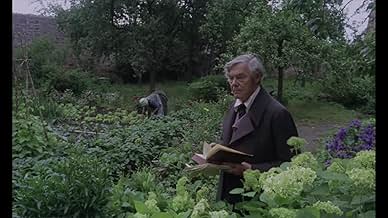L'énigme de Kaspar Hauser
Titre original : Jeder für sich und Gott gegen alle
- 1974
- Tous publics
- 1h 50min
NOTE IMDb
7,7/10
20 k
MA NOTE
Ce film d'Herzog s'inspire de l'histoire vraie et mystérieuse de Kaspar Hauser, un jeune homme qui apparut brusquement à Nuremberg en 1828, parlant et marchant à peine, et portant une étrang... Tout lireCe film d'Herzog s'inspire de l'histoire vraie et mystérieuse de Kaspar Hauser, un jeune homme qui apparut brusquement à Nuremberg en 1828, parlant et marchant à peine, et portant une étrange note.Ce film d'Herzog s'inspire de l'histoire vraie et mystérieuse de Kaspar Hauser, un jeune homme qui apparut brusquement à Nuremberg en 1828, parlant et marchant à peine, et portant une étrange note.
- Réalisation
- Scénario
- Casting principal
- Récompenses
- 5 victoires et 3 nominations au total
Avis à la une
Even if this film had failed on the level of character or narrative (which it doesn't), I would still love this movie for its incredible imagery. The memory/dream sequences are haunting and will never leave my head. The opening shot of a field, long blades grass bowing under the wind to the music of Pachelbel, is extraordinary. And of course there's the performance of Bruno S, the most intensely hypnotic and genuine performance you will ever see.
But my favorite scene is of the impresario and the dwarf king and his kingdom. This is a true Herzog moment -- bizarre but somehow still a moment of striking epiphany -- the dwarf a parallel, isolated soul to Kasper's own isolated, lonely soul. The extremity and weirdness of moments like these seem commonplace and everyday in a Herzog film, and therefore somehow commonplace and everyday even in our own lives.
But my favorite scene is of the impresario and the dwarf king and his kingdom. This is a true Herzog moment -- bizarre but somehow still a moment of striking epiphany -- the dwarf a parallel, isolated soul to Kasper's own isolated, lonely soul. The extremity and weirdness of moments like these seem commonplace and everyday in a Herzog film, and therefore somehow commonplace and everyday even in our own lives.
It's a well known philosophical conundrum, would a man be able to think (or even be properly considered a man) if he was denied all sensory stimulation? In Nuremburg in 1828, there was a practical test of this proposition, when a person was discovered in town who had spent all his previous life incarcerated and denied human contact. He was duly taught how to think; but in fact, was not grateful for the experience. Werner Herzog's film examines the strange life of Kaspar Hauser - I find it hard to say whether or not I consider it a good film, because that life itself was so strange. Certainly it better recreated the bafflement of those who interacted with Kaspar than it managed to suggest what it really felt like to be Kaspar - but then, who could know? It's probably not Herzog's greatest achievement - but it's certainly an intriguing subject.
"This is the story of a soul", someone said and I agree because loneliness is here described through a slow moving plot and endless silences which make us see Kaspar Hauser not as a man but as something more sulfuric, almost a being from outer space. The performance of Bruno S. is simply moving and caused me a lot of tears and the use of time through the narration is perfect for a film of this kind. The poetic vision of Werner Herzog is very peculiar and unique and you can love it or hate it but you cannot ignore it. Herzog doesn't care about the audience, he tells what it wants in the way he likes and that's the praise and the defect of European cinema and it's what makes the difference between European authors and American ones.
A truely visionary work!!I have always been fascinated with the story that this film tells.Herzog seems to be an expert at showing the way that an outsider relates to the world.Bruno S. is amazing in the lead role , Herzog has definitely made the right casting choice.the movie is just a must for all fans of cinema,even if your not a Herzog fanatic you will still be moved by this extraordinary vision!!!
EVERY MAN FOR HIMSELF AND GOD AGAINST ALL (Werner Herzog - West Germany 1974).
Lacking a traditional narrative or dramatic structure and full of obscure images, this film feels more like a hypnotic dreamlike experience. It also features one the more enduring trends in Herzog's work: the featuring of individuals with exceptional physical or psychological conditions.
The film is based on the true story of Kaspar Hauser, a young man who suddenly appears on the market square in the German town of Nuremberg in 1828. This strange occurrence has become one of the most enduring inspirations in German history, literature and science, with well over a thousand books written on the case. When Kaspar Hauser was found, he could barely grunt, let alone speak and caused a minor sensation among the locals. After living in a cellar for years with only a pet rocking horse, he is abandoned by his protector and provider, the mysterious "Man in Black." Having been isolated from all humans except his mysterious protector, Kaspar is suddenly thrust into civilization, and is expected to adapt himself to 19th-century society. He becomes a public spectacle and everyone in town lines up to catch a glimpse of him. Soon the local officials in town decide he is too much of a (costly) burden and, in an attempt to profit from the public interest, he is turned over to a circus ringmaster, where he is added to the local carnival freak show, as one of "The Four Riddles of the Spheres." The other three include "a midget king", "A little Mozart" (an autistic or catatonic child), and a lute playing "savage". When Hauser comes under the tutelage of a sympathetic professor (Walter Ladengast), he gradually acquires an impressive degree of socialization and learns to express himself with a reasonable degree of clarity, but most of society's conventions, manners and thoughts is more the young man is able to adjust to.
Herzog adopted a technique of incorporating film material shot by others filmmakers into the film. Early on in the film, just before Kaspar is found on the town square, Herzog used material shot on super 8 of a Bavarian landscape and the town of Dinkelsbühl, that was almost disposed off, but Herzog thought it would be ideal for his film. These grainy shots, accompanied by a requiem of Orlando DiLasso, make for one of the most haunting images I've ever seen on film. Dream sequences are another important aspect in this film. In one of them, Kaspar Hauser has dream images of the Sahara desert, for which Herzog used material he shot in the Western Sahara on earlier occasions. I don't know of any other director who used this technique to such avail up until now. One of the most stunning scenes is when the "Man in black" leaves him with the shot on the mountain and soon after the music with the requiem starts. It's almost like a romantic twist on 2001: A Space Odyssey.
Herzog has done a fantastic job recounting the legend of Kaspar Hauser to the screen. The casting of Bruno S. in the role of Kaspar Hauser is of particular interest. He was a street artist in Berlin, when Herzog found him and decided he would be ideal to play the role of Kaspar Hauser. Before this, Bruno S. had a troubled past. After being severely beaten by his mother, he became deaf and was placed in an institution for retarded children at the age of three. At nine, when he tried to escape, he was transferred to a correctional institution. With further escape attempts, he amassed a number of criminal offenses and was incarcerated for more than twenty years. The authenticity of Bruno's performance brings such an element of sincerity to the film, that makes it almost impossible not to root for his cause. Bruno S. also starred in Herzog's STROSZEK (1976).
Camera Obscura --- 10/10
Lacking a traditional narrative or dramatic structure and full of obscure images, this film feels more like a hypnotic dreamlike experience. It also features one the more enduring trends in Herzog's work: the featuring of individuals with exceptional physical or psychological conditions.
The film is based on the true story of Kaspar Hauser, a young man who suddenly appears on the market square in the German town of Nuremberg in 1828. This strange occurrence has become one of the most enduring inspirations in German history, literature and science, with well over a thousand books written on the case. When Kaspar Hauser was found, he could barely grunt, let alone speak and caused a minor sensation among the locals. After living in a cellar for years with only a pet rocking horse, he is abandoned by his protector and provider, the mysterious "Man in Black." Having been isolated from all humans except his mysterious protector, Kaspar is suddenly thrust into civilization, and is expected to adapt himself to 19th-century society. He becomes a public spectacle and everyone in town lines up to catch a glimpse of him. Soon the local officials in town decide he is too much of a (costly) burden and, in an attempt to profit from the public interest, he is turned over to a circus ringmaster, where he is added to the local carnival freak show, as one of "The Four Riddles of the Spheres." The other three include "a midget king", "A little Mozart" (an autistic or catatonic child), and a lute playing "savage". When Hauser comes under the tutelage of a sympathetic professor (Walter Ladengast), he gradually acquires an impressive degree of socialization and learns to express himself with a reasonable degree of clarity, but most of society's conventions, manners and thoughts is more the young man is able to adjust to.
Herzog adopted a technique of incorporating film material shot by others filmmakers into the film. Early on in the film, just before Kaspar is found on the town square, Herzog used material shot on super 8 of a Bavarian landscape and the town of Dinkelsbühl, that was almost disposed off, but Herzog thought it would be ideal for his film. These grainy shots, accompanied by a requiem of Orlando DiLasso, make for one of the most haunting images I've ever seen on film. Dream sequences are another important aspect in this film. In one of them, Kaspar Hauser has dream images of the Sahara desert, for which Herzog used material he shot in the Western Sahara on earlier occasions. I don't know of any other director who used this technique to such avail up until now. One of the most stunning scenes is when the "Man in black" leaves him with the shot on the mountain and soon after the music with the requiem starts. It's almost like a romantic twist on 2001: A Space Odyssey.
Herzog has done a fantastic job recounting the legend of Kaspar Hauser to the screen. The casting of Bruno S. in the role of Kaspar Hauser is of particular interest. He was a street artist in Berlin, when Herzog found him and decided he would be ideal to play the role of Kaspar Hauser. Before this, Bruno S. had a troubled past. After being severely beaten by his mother, he became deaf and was placed in an institution for retarded children at the age of three. At nine, when he tried to escape, he was transferred to a correctional institution. With further escape attempts, he amassed a number of criminal offenses and was incarcerated for more than twenty years. The authenticity of Bruno's performance brings such an element of sincerity to the film, that makes it almost impossible not to root for his cause. Bruno S. also starred in Herzog's STROSZEK (1976).
Camera Obscura --- 10/10
Le saviez-vous
- AnecdotesTo perform the scene in which Kaspar learns to walk, actor Bruno S. knelt for three hours with a stick behind his knees until his legs were too numb to stand.
- GaffesIn a brief scene we see a stork eating a frog with its legs tagged (ringed), but bird ringing didn't start until the end of the nineteenth century, decades after the life of Kaspar Hauser.
- Citations
Opening caption: Do you not then hear this horrible scream all around you that people usually call silence.
- Crédits fousOpening credits prologue: One Sunday in 1828 a ragged boy was found abandoned in the town of N. He could hardly walk and spoke but one sentence.
Later, he told of being locked in a dark cellar from birth. He had never seen another human being, a tree, a house before.
To this day no one knows where he came from - or who set him free.
Don't you hear that horrible screaming all around you? That screaming men call silence?
- ConnexionsFeatured in Je suis ce que sont mes films (1978)
- Bandes originalesCanon in D major
Composed by Johann Pachelbel
Meilleurs choix
Connectez-vous pour évaluer et suivre la liste de favoris afin de recevoir des recommandations personnalisées
- How long is The Enigma of Kaspar Hauser?Alimenté par Alexa
Détails
- Date de sortie
- Pays d’origine
- Langue
- Aussi connu sous le nom de
- The Enigma of Kaspar Hauser
- Lieux de tournage
- Croagh Patrick, Westport, Mayo, Irlande(archive footage)
- Sociétés de production
- Voir plus de crédits d'entreprise sur IMDbPro
Box-office
- Montant brut mondial
- 3 451 $US
- Durée
- 1h 50min(110 min)
- Mixage
- Rapport de forme
- 1.66 : 1
Contribuer à cette page
Suggérer une modification ou ajouter du contenu manquant


